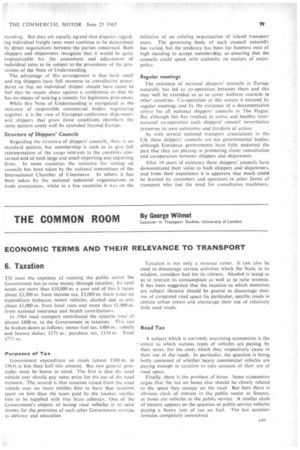THE COMMON ROOM
Page 81

If you've noticed an error in this article please click here to report it so we can fix it.
By George Wilmot
Lecturer in Transport Studies, University of London
ECONOMIC TERMS AND THEIR RELEVANCE TO TRANSPORT 6. Taxation
TO meet the expenses of running the public sector the Government has to raise money through taxation. Its total needs are more than £10,000 m. a year and of this it raises about £3,500 m. from income tax, £3,000 tn. from taxes on expenditure (tobacco, motor vehicles, alcohol and so on), about 11,000 in, from local rates and more than £1.000 rn. from national insurance and health contributions.
in 1964 road transport contributed the sizeable total of almost £800 m. to the Government in taxation. This can be broken down as follows: motor fuel tax, £486 in.: vehicle and licence duties, £171 in.; purchase tax, £114 in. Total 071 m.
Purposes of Tax Government expenditure on roads (about £300 m. in 1964) is less than half this amount. But two general principles must be borne in mind. The first is that the road vehicle user should pay some price for his use of the road network. The second is that taxation raised from the road vehicle user no more entitles him to have that taxation spent on him than the taxes paid by the smoker entitles him to be supplied with free State ashtrays. One or the Government's objects of taxing road vehicles is to raise money for the provision of such other Government services as defence and education. Taxation is not only a revenue raiser. It can also be used to discourage certain activities which the State, in its wisdom, considers bad for its citizens. Alcohol is taxed so as to restrain its consumption as well as to raise revenue. It has been suggested that the taxation to which motorists are subject likewise should be geared to discourage their use of congested road space (in particular, specific roads in certain urban areas) and encourage their use of relatively' little used roads.
Road Tax
A subject which is currently exercising economists is the extent to which various types of vehicles are paying, by their taxes, for the costs which they respectively cause in their use of the roads. in particular, the question is being hotly contested of whether heavy commercial vehicles are paying enough in taxation to take account of their use of road space.
Finally, there is the problem of buses. Some economists argue that the tax on buses also should be closely related to the space they occupy on the road. But here there is obvious clash of interest in the public sector or finance, as buses are vehicles in the public service. A similar clash of interest appears on the question of public service vehicles paying a heavy rate of tax on fuel. The last question remains completely unresolved.




























































































































